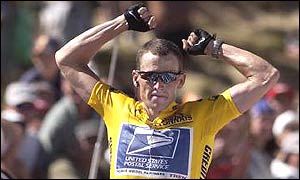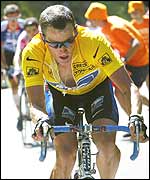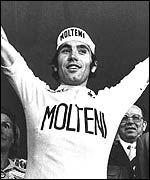




Armstrong reaches new heights
Lance Armstrong's rivals on the Tour de France knew exactly how he was going to win the race for the fourth time in succession - but they have found doing anything about it rather harder to work out.
Armstrong's victory, clinched on Sunday, was won in the same mightily impressive fashion as the previous three.
The Texan bides his time in the first week, waiting for the race to hit the mountains, and then he pounces.
Armstrong tipped to break all records
Somewhere on the gruelling final climb of the first mountain stage, Armstrong
will accelerate hard, pulling quickly away from the group of hopefuls who
had been gathered around him.
" I've read that I flew up the hills and mountains of France - but you don't fly up a hill, you struggle" - Lance Armstrong
He will open up a lead of 50 metres or so, and then he will glance behind
him, just to make sure that he has left his rivals for dead. And off he will
go.
By the top, Armstrong will have claimed the leader's yellow jersey, which will remain his until the Tour hits Paris, thanks to a series of equally brilliant rides in the mountains.
These tactics have become Armstrong's signature as he has established himself as the greatest cyclist of his generation.
This year, there had been hopes among the other riders that Armstrong might be beatable.
He had seemed less strong than usual in the races leading up to the Tour.
Armstrong climbs into yellow
And once the Tour started, he was beaten in the first long-distance time trial
by Colombian Santiago Botero - the first time Armstrong had not won such a
stage for four years.
But on the climb to La Mongie in the Pyrenees, Armstrong dismissed these hopes, leaving his rivals beaten both mentally and physically.
Armstrong leaves rivals breathless in his wake on the toughest climbs
Armstrong makes riding up these daunting mountains appear easy, spinning his legs at a pace that maximises efficiency but is beyond most of his rivals.
Yet, as he says in his autobiography It's Not About The Bike: "I've read that I flew up the hills and mountains of France. But you don't fly up a hill.
"You struggle slowly and painfully up a hill and maybe, if you work very hard, you get to the top ahead of everybody else."
Armstrong attributes his superiority to physiology.
He says doctors have told him his body metabolises oxygen at an unusually high rate.
He also produces very low levels of lactic acid, the chemical that is produced when the body is tired and which makes the lungs burn and the muscles ache.
Armstrong anger at drugs inquiry
Given cycling's recent history, the subject of performance-enhancing drugs
is never very far away.
No case against Armstrong has ever been proved and he insists he is clean.
But he does have close links with the Italian doctor Michele Ferrari, who this year is on trial for supplying drugs to cyclists.
Armstrong insists Ferrari is innocent, that the doctor has never supplied him with anything illicit and that he sees nothing wrong in their association.
Nevertheless, the links provide ammunition for Armstrong's detractors - many of them Tour traditionalists who do not like a brash American taking over their sport.
Sports Talk: How long will Lance dominate?
But none of this can ever take away from what Armstrong has achieved, nor
the odds he has overcome to do so.
There is no point trying for the Tour de France until
Lance retires
David Millar
Cyclist
Already a cycling world champion, Armstrong was diagnosed in 1996 with testicular
cancer. It had spread to his lungs and brain, and doctors rated his chances
of survival at 20%.
The cancer, Armstrong has said, put cycling firmly into perspective - but he was determined to beat it and race again, a battle movingly described in his book.
As he recovered his health and fitness, Armstrong discovered that his muscles returned in a different way.
He was lighter, and therefore better suited to the climbs that define the Tour de France. And since his first victory in 1999, he has never looked back.
In the race widely regarded as sport's most gruelling physical test, his daunting performances have created an aura of invincibility around him.
When he won the race for a second time in 2000, Armstrong said that he should not yet be counted among the all-time greats - men like Bernard Hinault and Eddy Merckx, who won five consecutive Tours.
Armstrong v Indurain
"If I want to win five," he said, "I will have to ride six
or seven because there are lots of other good riders and you can't win every
year."
Can Armstrong beat Merckx's record of five consecutive Tours?
But it is time for that opinion to be revised.
Rising British star David Millar says: "There is no point trying for the Tour de France until Lance retires."
Armstrong has given no indication of when that will be, beyond saying he would like to become the first man in history to win six Tours.
Hinault believes Armstrong can do it.
"It all depends on him, on whether he keeps the motivation to do it.
"He's just too good for the rest."
Our intention is to keep club members up to date with the goings on within
the
club, as well as keeping past members and indeed anyone else who
interested.
We would also appreciate it if you would send us feedback and of course
anything you’d like to see on the site.
We’d really love photos to include on this site. So get those cameras out.<Story::CGlyphBreak>
After all it’s you, we want to keep coming back to this site as well as
your
friends etc.